- Landline
- (512) 491-5244
- info@aspiredental.com
- @AspireDentalTX
- 271220342890747
- Video
- welcome to aspire dental - dr. brandon hall
- Website
- www.aspiredental.com
- Reservations
- www.smilereminder.com
- Menu
- www.aspiredental.com
Description
At Aspire Dental, we are driven by one fundamental principle: delivering unparalleled dental care to every patient we serve. Nestled in the heart of Austin, we utilize the highest quality materials, age-old techniques, and the latest technological advancements in dentistry. Our experienced dentists and devoted staff are not just here to treat you; they’re here to understand you. It’s this ethos of understanding that allows us to tune into your concerns and tailor solutions that match your dental aspirations. From crafting radiant smiles with cosmetic dentistry or porcelain veneers to foundational treatments like mini dental implants and cavity fillings, our clinic caters to all your dental needs. The modern dentistry landscape has evolved, offering comfort like never before. Recognizing this, we also offer sedation for those who prefer a relaxed dental experience. After all, your smile is central to life’s everyday moments, whether you’re talking, eating, or engaging socially. It’s more than aesthetics; it’s an investment in your well-being. At Aspire Dental, we want to make this investment seamless for you. When you step into our clinic, expect an effortless insurance process, with claims filed directly on your behalf. We ensure you’re well-prepped before your first visit and guide you through our comprehensive evaluations. Plus, if budgeting is a concern, we’re here to discuss flexible financing to prioritize your health. We don’t just aspire to transform smiles, but to set a new standard in dental care. Experience the Aspire Dental difference today.
Keywords Mini Dental Implants, Dental Implants, Cosmetic Dentistry, Implant Dentistry, Orthodontics, Dental Sealants, Root Canals, Extractions, Dental Fillings, Wisdom Teeth, Periodontal Treatment, Crowns & Bridges, Teeth Whitening, Porcelain Veneers, Dental Bonding, Dentures, Sedation Dentistry.
Reviews
Opening hours
Payment Options
American Express , Visa , Cash , Check , Discover , Financing , MasterCard
Products And Services
-
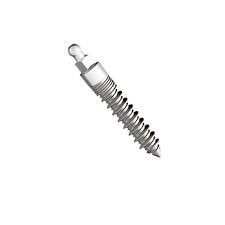
Mini Dental Implants
If you have lost permanent teeth, you're not alone. More than 32% of older adults in Texas are missing six or more teeth. Because bone loss occurs rapidly when teeth are missing, efficient replacement is key to long-term oral and bone health. Dental implants are a proven solution for replacing missing teeth. At Aspire Dental, we offer pioneering mini dental implants to accommodate a wider range of patients. Clinical studies and case reports spanning over two decades strongly support mini dental implants. These innovative implants serve the same purpose as traditional dental implants but provide significant advantages. [ux_video url="https://www.youtube.com/watch?v=xtb2SvskHwo"] What Are Mini Dental Implants? Traditional dental implants are prosthetic tooth roots that support replacement teeth. They are placed in the jawbone, offering a permanent solution for replacing missing teeth. Advancements in implant dentistry have paved the way for revolutionary mini dental implants, a smaller alternative to traditional implants. Unlike a traditional implant, which has an average diameter of 5 millimeters, the width of a mini implant is less than 3 millimeters. This narrow version is about the size of a toothpick. Because of their small size, mini implants are especially valuable for individuals with narrow or weak jawbones. Additionally, while the conventional option has multiple components, the mini version has a more streamlined, single-piece design. The implant post is made from durable titanium and has a screw on one end and a ball on the other. When we implant the screw into the jawbone, the ball end sits just above the gums. This part connects securely to an artificial crown, bridge, or dentures using a rubber O-ring. Who Is a Good Candidate for Mini Implants? Mini dental implants are an excellent solution for replacing one, many, or all of your teeth. If you are wondering if you are a good candidate for mini implants, consider the following questions: Do you have gaps in your smile that you'd like to address with a permanent solution? Is your jawbone weak or narrow? Do you want to avoid complicated, multi-step procedures? Are you looking for a swift, minimally invasive solution? Would you like to stabilize loose dentures? Are you worried about treatment costs? Would you like to preserve your facial appearance? If you answered yes to any of the above questions, mini dental implants may be right for you. However, some factors and conditions may influence whether a patient is a good candidate for mini implant treatment. For example, smoking tobacco, undergoing radiation or chemotherapy, and taking certain medications can affect your eligibility for mini implants. Other conditions, such as diabetes and certain diseases, also play a role. At your free consultation, we will review your medical history to help us determine if you are a strong candidate for mini dental implants or if another treatment is needed instead.
Video: Mini Dental Implants
Link: Mini Dental Implants
-
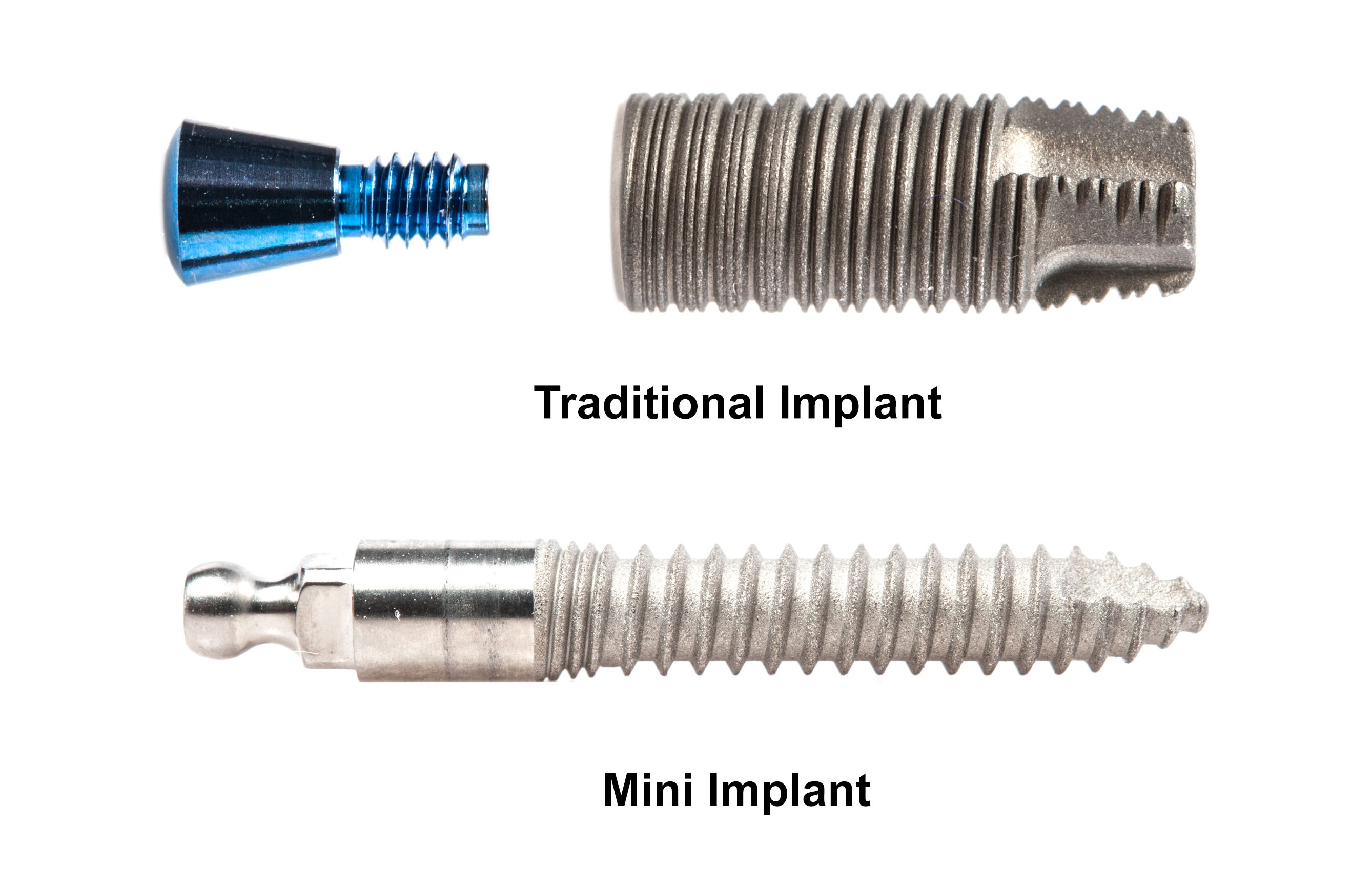
Dental Implants
Almost 12% of Texas adults ages 18 and older have lost six permanent teeth or more. Even losing one tooth impacts how we function on a daily basis. Missing teeth force you to adjust the foods you eat, make it difficult to speak as you normally would, and cause you to hesitate when you want to laugh or smile. If you are looking for a reliable tooth replacement solution, dental implants can restore your bite and enhance your smile. At Aspire Dental, we specialize in pioneering mini dental implants, smaller versions of traditional dental implants. [ux_video url="https://www.youtube.com/watch?v=l9khOtit6Hs"] What Are Dental Implants? Dental implants are versatile tooth replacement devices used in the following scenarios: If you are missing a single tooth, we can replace it with an implant and a crown. If you have lost one or more teeth in a row, we can fill the gap with an implant-supported bridge. If you have lost all your teeth, we can replace them with non-removable or semi-removable dentures. If you have a preexisting denture that you'd like to stabilize, we can anchor the denture with dental implants. They provide a long-lasting solution for replacing missing teeth due to the titanium material's durability and the implant's fusion with the jawbone. Dental implants have long been a solution for replacing missing or damaged teeth. While there is value in conventional implants, mini dental implants offer a revolutionary approach with many added benefits. With over 20 years of research-backed results, mini implants are a superior tooth replacement solution for many individuals. Traditional and mini implants differ in the following areas: Size Design Treatment timeline Placement procedure Recovery time Cost Traditional Implants Conventional dental implants average 5 to 7 millimeters in diameter. The implant is made of multiple components, including the screw that is placed in the jawbone, the connector piece (called an abutment) that sits above the gum line, and a restoration like a crown, bridge, or denture that is visible when you smile. Due to the implant's size, many people with narrow jawbones or low bone density are deemed ineligible for traditional implants or require bone grafting surgery before the implant procedure can begin. Bone grafting involves rebuilding the jawbone by transplanting tissue from elsewhere in the body or from a tissue bank. Doing so encourages the bone to regenerate, increasing the jawbone's density and volume over time. Unfortunately, the bone needs to heal completely before conventional implants can be placed. Although recovery times vary, it can take 6-9 months for the jaw to recover fully. Even when bone grafting isn't needed, dental implant treatment unfolds over multiple stages. Once the screw is implanted in the jaw, it takes at least six months for the jaw to heal before the abutment and restoration can be attached. This prolonged treatment timeline creates a barrier for those looking for a quick tooth replacement solution, such as individuals with dental anxiety or anyone who wants to avoid complicated multi-stage procedures.
Video: Dental Implants
Link: Dental Implants
-
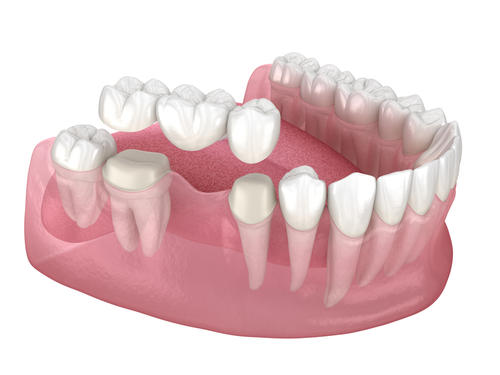
Dental Bridges
Over 54% of Texans aged 45-64 have had at least one permanent tooth extracted due to tooth decay or gum disease, but tooth loss can affect anyone. Whether you have lost a permanent tooth due to decay, disease, trauma, injury, or bruxism, it is important to replace it swiftly. Dental bridges are an excellent option for replacing one or more teeth in a row, restoring both function and aesthetics. At Aspire Dental, we believe that everyone deserves a beautiful and functional smile. For over 15 years, Dr. Hall and Dr. McNeil have helped patients restore their smiles and regain their quality of life through personalized dental solutions like dental bridges. What Are Dental Bridges? If you have lost a tooth or need an extraction, we provide various replacement options at Aspire Dental. One of these is a dental bridge, which "bridges" the gap left by a missing tooth. Bridges are a fixed (non-removable) replacement solution for patients who have lost one or more consecutive teeth in a single area of the mouth. A traditional dental bridge looks like a row of artificial teeth with dental crowns on each end. These crowns fit over the natural teeth on both sides of the gap. The pontic, or fake tooth, "floats" between the crowns to fill in the gap in your smile. The Purpose of Dental Bridges When suffering from tooth loss, it is important to replace missing teeth quickly with a restoration like a dental bridge. Dental bridges serve several key purposes, including: Stop teeth from shifting: When you lose a tooth, neighboring teeth will shift toward the gap. Bridges block the teeth, preventing movement that leads to misalignment. Misaligned teeth alter your bite, making eating and chewing difficult. Overlapping teeth are also tougher to clean effectively. With a bridge, you don't have to worry about these concerns. Restore your bite force: Eating is a challenge when teeth are missing. Healthy eating is even harder. Many people with missing teeth adapt their diets, favoring foods that are easy to eat but not necessarily nutritious. By restoring your chewing function, bridges allow you to eat a healthy, well-balanced diet. Repair your smile and improve your self-confidence: Gaps in your smile can be embarrassing, causing changes in your daily life. Some people avoid social interactions because of lowered self-esteem, while others hesitate to laugh or smile. By restoring your smile, dental bridges help improve your self-confidence. Remedy speech issues: You may have noticed that pronouncing certain words is difficult because of your missing tooth. The teeth play an important role in speaking clearly, so it's no surprise that losing a tooth—especially a front tooth—presents speech challenges. Because they properly control airflow, bridges allow you to speak as you used to. Maintain good oral health: Besides halting shifting teeth, bridges prevent decay-causing bacteria from accumulating in the gap and causing cavities or gum disease. A bridge helps you to clean your teeth effectively by following a standard oral hygiene routine. Dental Bridge Varieties There are several types of dental bridges. The variety that is right for you will depend on the health of your existing teeth, the number of teeth missing, and the location of the gap in your mouth. At Aspire Dental, we collaborate with you to plan the most effective treatment that aligns with your needs, preferences, and budget. Traditional Dental Bridges A traditional dental bridge includes a row of artificial teeth with crowns on each end that fit over your natural teeth. In order for us to place a traditional bridge, the teeth on each side of the gap must be in good health. This is because your natural teeth support the restoration and absorb your chewing force. If the teeth aren't healthy, the bridge won't have the support it needs, making it more likely to fail. A traditional bridge is fixed in place, so you'll never need to remove it yourself. This stands in contrast to partial dentures, which are removable appliances.
Video: Dental Bridges
Link: Dental Bridges
-
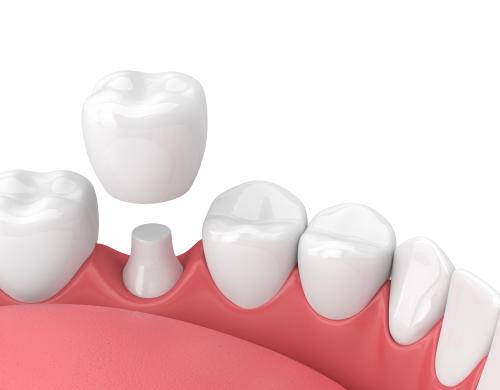
Dental Crowns
If your tooth is damaged, you may experience pain, sensitivity, or tenderness. You might also spot a crack or break. In these cases, we may recommend a dental crown to restore and protect your tooth. Dental crowns are commonly used in dental offices to prevent further damage to impaired teeth. From cracks and decay to wear and discoloration, crowns can address a variety of restorative and cosmetic needs. Since 2007, the compassionate team at Aspire Dental has been dedicated to helping our patients achieve optimal oral health. Driven by a patient-centered approach, we believe everyone deserves a beautiful, functional smile that meets their dental needs and goals. If you need a dental crown, you're not alone. Single dental crowns are the most common restorative procedure in dentistry today. [ux_video url="https://www.youtube.com/watch?v=0HyjOj8b2cU"] Understanding Dental Crowns A dental crown is a "cap" that encompasses the entire surface of your tooth, completely concealing it. These tooth-shaped coverings are used to restore teeth that are: Cracked or broken Worn down (from bruxism or other causes) Significantly decayed Misshapen Discolored Additionally, crowns protect teeth that have been: Treated with a root canal Restored with a large dental filling Replaced with a dental implant While the primary purpose of dental crowns is restorative, they can also be used cosmetically to enhance the look of your teeth. Crowns improve the shape, size, and function of teeth, offering both functional and aesthetic improvements. However, if your main concern is cosmetic, dental veneers may be a more suitable treatment. Types of Dental Crowns Dental crowns are made from various materials to meet patients' unique needs and preferences. Materials like metal, resin, porcelain, and other ceramics used in dental crowns have different advantages and disadvantages. For example, some materials are stronger, providing more stability and durability. These options, however, are typically more expensive. Some materials look more natural and are often used to cap front teeth or those that are visible when you smile. Tooth-colored crowns, made from a ceramic material or composite resin, blend seamlessly with your teeth like composite fillings. However, fillings are used for minor to moderate cavities, whereas crowns are for larger ones. Crowns are also used to support dental bridges—a dental appliance that replaces one or more missing teeth in a row. This type of restoration has crowns on each end that attach to healthy natural teeth. A fake tooth or teeth sit between the crowns to "bridge" the gap. Mini Implant-Supported Crowns Our goal is to restore the health of your natural teeth whenever possible. However, if a tooth is too damaged to be capped with a crown, we can extract the tooth and replace it with a mini dental implant. Mini dental implants are prosthetic tooth roots made from durable titanium. We screw these into your jawbone for stability that can last a lifetime. Mini implants are a smaller alternative to traditional dental implants. Both support a restoration like a crown, bridge, or denture, but mini implants offer significant advantages: Because they are half the size of conventional implants, mini implants are an excellent choice for individuals with bone loss. We can place mini implants in a single office visit due to their narrow size and the efficient placement technique we employ. Mini implants can be immediately loaded, meaning you will see immediate results from your tooth replacement procedure. The procedure for placing mini implants is minimally invasive, ensuring a comfortable experience that allows you to recover quickly. Mini implants are more affordable, cutting the cost of traditional implants in half. If your tooth is too damaged to be treated with a traditional dental crown, we can extract the tooth and replace it with a mini implant and natural-looking artificial crown.
Video: Dental Crowns
Link: Dental Crowns
-
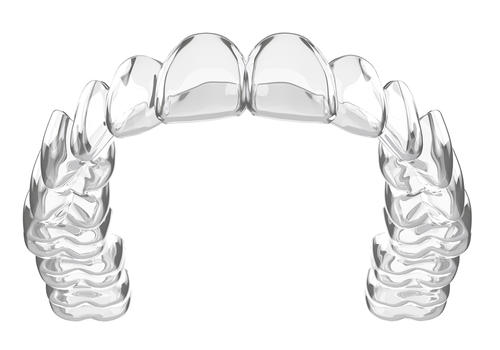
Invisalign
Shifting, misaligned teeth don't just impact children and teenagers. In fact, about 25% of orthodontic patients today are adults. If you are looking for a straighter smile, it's not too late. Treatments like Invisalign offer a discreet option for patients who want to avoid the common drawbacks of traditional braces. While Invisalign has recently become a popular treatment option for teenagers, many of our adult patients have long preferred this treatment because of the many advantages of clear aligners. Keep reading to learn more. [ux_video url="https://www.youtube.com/watch?v=OmZKIyJ4sdE"] What Is Invisalign? Invisalign, sometimes called invisible braces, is a well-established orthodontic treatment designed to straighten teeth. This alternative to traditional braces has been used for about 25 years. Users wear clear aligners over their teeth for approximately 22 hours per day, removing them during meals and cleaning while keeping them on overnight. This treatment is as effective as braces for realigning teeth because they shift teeth using the same method. However, Invisalign does not use a bulky bracket-and-wire system to do so. Instead, the repositioning is performed by nearly invisible trays that conform to your teeth's contours. As a result, clear aligners like Invisalign offer a more discreet solution for teeth straightening. Invisalign is a versatile solution for many common alignment problems, such as: Overbites Underbites Crossbites Open bites Crowded teeth Gaps between teeth Crooked teeth How Do Clear Aligners Straighten Teeth? Invisalign treatment involves wearing a series of transparent plastic trays that are custom-made to conform to each person's unique dental structure. These aligners work systematically to reposition teeth by applying consistent, gentle pressure. As a result, Invisalign moves teeth progressively from their initial alignment to achieve the desired final positioning. It is the patient's responsibility to properly insert and remove these aligners during their orthodontic treatment. This means wearing them for 22 hours daily and moving on to the next set of aligners every 1-2 weeks or as directed by Dr. Hall or Dr. McNeil. How Does Invisalign Differ from Braces? Invisalign clear aligners have become a popular orthodontic treatment due to their many advantages over traditional braces. Appearance Traditional braces use metal or ceramic brackets bonded to the teeth. These brackets are connected by wires and secured with rubber bands. Unlike Invisalign, this traditional system is very visible when you smile and can be noticeable even when your mouth is closed. If you're looking for a low-profile orthodontic solution, Invisalign may be a better choice. Invisalign uses clear, removable trays that are nearly invisible when worn. This makes Invisalign a more discreet option for those concerned about their appearance during treatment.
Video: Invisalign
Link: Invisalign
-
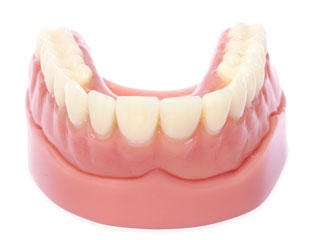
Dentures
Nearly 1 in 8 Texans aged 65 and older are edentulous, meaning they have no natural teeth. Substantial tooth loss can make everyday activities like speaking, smiling, and eating more challenging. By replacing missing teeth, individuals coping with tooth loss can restore their bite function and smile confidently. For years, dentures have been a popular solution for replacing missing teeth. In fact, 90% of Americans without teeth have some type of denture. [ux_video url="https://www.youtube.com/watch?v=TGtSAeA2uTc"] At Aspire Dental, we are sensitive to the challenges that tooth loss creates. That's why we provide compassionate guidance to help you choose a denture solution that suits you. By pairing an array of denture options with years of expertise, you can take solace in knowing that we are well-equipped to help you regain your quality of life. Full and Partial Dentures There are two types of traditional dentures: full dentures and partial dentures. The type that you need depends on the severity of your tooth loss. Full Dentures Full dentures are removable dental appliances designed to replace a complete set of natural teeth in the upper or lower jaw or both. They consist of a gum-colored acrylic base that fits over the gums and an artificial gumline to hold the prosthetic teeth in place. The prosthetic teeth are typically made of porcelain or acrylic materials to resemble the look of natural teeth. Full dentures are custom-fitted, supporting your facial muscles and enabling you to speak and chew more easily. Depending on how well they are maintained, the lifespan of full dentures can range from 5 to 10 years. Partial Dentures Like full dentures, partial dentures are custom-made and removable dental appliances. However, these replace one or more missing teeth when an individual still has some remaining natural teeth in their upper or lower jaw. Partial dentures comprise a metal or acrylic framework that attaches to the natural teeth with clasps. Artificial teeth are set into the framework to fill the gaps created by missing teeth. Partial dentures improve chewing ability and restore the appearance of a complete smile while allowing the remaining natural teeth to remain in place. Because some natural teeth support partial dentures, they may last longer than full dentures. While it depends on the materials used, some partial dentures can last up to 15 years. The Drawbacks of Traditional Options While traditional dentures have long been used as a tooth replacement method, they have some significant drawbacks. Dentures cannot truly imitate the look, feel, or function of natural teeth: When prosthetic teeth are made from acrylic, they fail to mimic the translucence and texture of real teeth. They also lack the strength of natural teeth. Because dentures cannot withstand the same bite forces, denture wearers often have to change their eating habits, making it difficult to maintain a healthy diet that includes raw fruits, vegetables, and nuts. Their fit changes over time, making eating and speaking difficult: Losing a tooth leads to continual bone loss and gum recession. This, along with the frequent removal of the denture, causes the fit of your dentures to loosen. As a result, many denture users experience irritation and mouth sores from dentures that shift around. Sometimes, dentures pop out when eating or speaking, leading to speech impediments, chewing difficulty, and embarrassment. Some people resort to using messy denture adhesive to help secure their dentures. To maintain their function, they must be periodically adjusted: Due to the changes in how dentures fit over time, they must be regularly reshaped or even remade. A denture reline adds material to create a better fit. They are easily lost or broken: Traditional dentures are removable, meaning they are easily lost or broken. When taken out for sleeping, cleaning, or comfort, dentures are vulnerable to dropping and breaking or becoming lost. The stress of frequent removal and chewing forces also compromise the dentures' integrity. Traditional dentures cannot prevent bone loss: The roots of your teeth are embedded in your jaw. When you chew or bite, the teeth stimulate the jawbone to keep it healthy and strong. Unfortunately, even losing one tooth leads to bone loss. While dentures replace the missing teeth, they do not replace the tooth roots. As a result, dentures cannot stimulate the jawbone to maintain its long-term health.
Video: Dentures
Link: Dentures
-
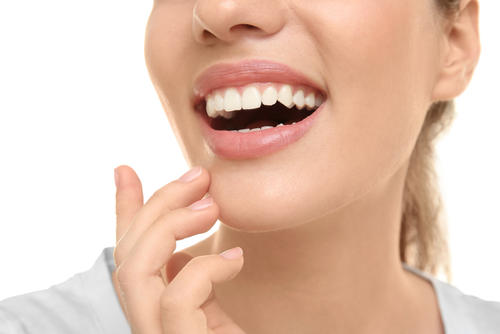
Cosmetic Dentistry
A beautiful smile is a powerful asset. It can boost your self-confidence, encourage positive social interactions, and convey approachability and youthfulness. Research has shown that smiling can even trigger a release of endorphins, promoting feelings of happiness and reducing stress. However, we aren't all happy with our smiles. If you feel that your smile is flawed, cosmetic dentistry can help. At Aspire Dental, we provide a comprehensive range of cosmetic treatments to improve your smile's appearance. What Is Cosmetic Dentistry? Cosmetic dentistry refers to dental procedures that aim to improve the appearance of your smile. Some of the most popular cosmetic treatments are teeth whitening, porcelain veneers, and dental bonding. What Issues Does Cosmetic Dentistry Address? You may be a good candidate for cosmetic dentistry if you'd like to address any of the following imperfections: Stained or discolored teeth Misshapen teeth or teeth that appear too small Chips or cracks Missing teeth Gaps or spaces between teeth Crooked or misaligned teeth However, if you are seeking cosmetic services but have oral health concerns, we will need to address these issues first using restorative approaches. Such issues include cavities and gum disease. When these problems are remedied, we can move forward with smile enhancement treatments. Cosmetic Dentistry Services At Aspire Dental, we offer a comprehensive range of dental services to improve your smile. While some are fundamentally cosmetic, others serve both aesthetic and restorative purposes. These treatments can be performed individually or in conjunction with each other to achieve the smile you have always wanted. We will design your individualized treatment plan based on your desired degree of transformation, the extent of your cosmetic needs, as well as your preferences and budget. Teeth Whitening Teeth whitening is the most sought-after cosmetic procedure in dental offices today. At Aspire Dental, we offer professional teeth whitening using Philips Zoom products to deliver exceptional results. In-office treatments can effectively and efficiently address stubborn stains and discoloration in just 45 minutes, yielding a significantly whiter smile. Additionally, we provide customized at-home whitening kits that allow you to brighten your smile from the comfort of your home. This convenient option doesn't compromise on quality. Our take-home kits offer beautiful, consistent results that over-the-counter treatments can't match.
Video: Cosmetic Dentistry
Link: Cosmetic Dentistry
-

Veneers
A beautiful smile captures attention, but it can be difficult to smile proudly when self-conscious about your teeth. If you are ready to enhance your grin, we can help. At Aspire Dental, we offer diverse solutions for addressing cosmetic concerns. Veneers are among the most popular cosmetic dentistry treatments in dental offices today. Designed to correct smile imperfections such as discoloration, gaps, cracks, and more, veneers can dramatically transform your smile. [ux_video url="https://www.youtube.com/watch?v=2X_kwReJEoA"] What Are Veneers? Dental veneers are thin shells that cover the front surface of your teeth. Approximately the same thickness as a fingernail, veneers seamlessly enhance the appearance of your smile. These coverings are customized for your teeth in accordance with your smile vision. Veneers are most often placed in pairs on the upper front teeth. However, we can apply veneers as needed to achieve your desired look, even covering all the teeth in your smile line. Veneers are commonly made from composite resin or porcelain. While the composite variety is considered a more conservative option, porcelain veneers are more natural and long-lasting. What Do Porcelain Veneers Address? If you have cosmetic concerns, veneers can camouflage various flaws to elevate your smile. Discoloration: Stained or discolored teeth can appear yellow or brown, or they may have dark or white spots on them. Porcelain veneers effectively conceal stains, providing a brilliantly white and uniform appearance, even for stubborn discolorations that resist traditional whitening methods. Irregular shape: Veneers can transform irregular or uneven teeth, creating a more aesthetically pleasing and symmetrical smile. Whether your teeth are too small, misshapen, or worn down, veneers can help. Cracks or chips: Imperfections like cracks and chips can be concealed by a veneer, restoring the integrity of the tooth's structure and appearance. Gaps between teeth: Veneers are a versatile solution for closing gaps or uneven spaces between teeth, creating a seamless and harmonious smile. Minor misalignment: For minor misalignments or irregularities in tooth positioning, veneers can provide a visually straighter appearance without needing orthodontic treatment. However, for more substantial misalignment, we may recommend Invisalign® clear aligners. While veneers are a versatile cosmetic treatment, they cannot be used to fix cavities or treat oral health conditions like decay, periodontal disease, or root canal infection. These should be addressed first with restorative treatments such as fillings, gum disease treatment, or root canal therapy. After treating the damaged teeth or gums, we can begin cosmetic procedures. By prioritizing restorative procedures, we can improve your oral health and create a strong foundation for your veneers. If you grind or clench your teeth, you may not be a good candidate for this cosmetic treatment, as the excessive force exerted on your teeth can damage the veneers. However, a night guard can help protect your transformed smile. Porcelain Veneers vs. Tooth-Colored Crowns Patients often wonder how veneers differ from dental crowns. Both porcelain veneers and tooth-colored crowns improve the appearance of your teeth, but crowns are primarily a restorative treatment, while veneers are a cosmetic one. Unlike a veneer, a crown covers the entire tooth surface and is used for more extensive damage. Crowns restore the structural integrity of teeth damaged from decay, chips, or fractures. They also stabilize weak teeth and provide a protective barrier following root canal treatment. Occasionally, crowns are used for severely stained teeth. However, because crowns surround the entire tooth and are thicker than veneers, we must remove more of your tooth's natural enamel.
Video: Veneers
Link: Veneers
-

Dental Bonding
If you're not happy with your smile, we can help. At Aspire Dental, we offer comprehensive cosmetic dentistry services to help you smile proudly. One of these services is dental bonding—one of the most common procedures used in dental offices today. This procedure quickly and painlessly improves the appearance of your smile. Dr. Hall and Dr. McNeil at Aspire Dental are dedicated to enhancing your smile through cosmetic treatments like dental bonding, aiming to boost your confidence in your smile. Their expertise and commitment ensure that you receive personalized care to achieve your desired smile. [ux_video url="https://www.youtube.com/watch?v=jOseOsk-qDA"] What Is Dental Bonding? Cosmetic dental bonding involves applying a white putty-like material to the teeth and hardening it with a special curing light. Doing so alters the size, shape, and color of your teeth to improve your smile's appearance. The bonding material is a tooth-colored resin made from a mixture of plastic and glass. This resin is highly malleable and can be shaped and molded to match the natural color and contours of your teeth, providing a seamless and aesthetically-pleasing solution for various dental issues. What Is Dental Bonding Used For? Bonding material is a versatile solution that repairs, reshapes, or otherwise enhances the appearance of your teeth. Dental bonding can address imperfections like: Chipped or broken teeth Discolorations or stains Spaces between teeth Misshapen teeth Short teeth The composite material can also be used for restorative purposes, such as for tooth-colored fillings. Who Is a Good Candidate? If you are looking to impressively enhance your smile by addressing small imperfections, dental bonding may be right for you. However, this treatment does not address extensive damage or decay, severely misaligned teeth, or more significant cosmetic concerns. Dental crowns and fillings are better suited to restoring function to damaged teeth, while orthodontic solutions like Invisalign® can correct alignment issues. Additionally, if you have a history of frequent teeth grinding or clenching, you may not be an ideal candidate, as bonding material can chip or crack in such cases. The Procedure At your consultation, we will talk through your cosmetic concerns and goals, examine your teeth, review your medical history, and discuss your hygiene routine. This information will help us determine if dental bonding is a good choice and help us design a treatment plan that considers your needs and preferences. To prepare for the treatment, we will select the best composite resin shade that matches your natural tooth color best. We'll then lightly etch the surface of whatever teeth are being treated. The slightly roughened texture helps the bonding material adhere securely. We will also apply a bonding agent to help the resin cling to the teeth. Once the tooth is prepared, we will apply and shape the composite resin. Sculpting the material to match the contours of your teeth while achieving the desired shape and size is a skill that Dr. Hall and Dr. McNeil have perfected over their careers. Using a dental curing light, we will harden the resin so it becomes firm and durable. After curing, we will make any final adjustments to the bonding material, ensuring it fits comfortably and matches the surrounding teeth's shape and color.
Video: Dental Bonding
Link: Dental Bonding
-

Teeth Whitening
Teeth whitening is the most common cosmetic treatment performed in dental offices today. Whitening is a quick and powerful method for transforming your smile without undergoing more complex procedures. At Aspire Dental, we offer professional teeth whitening services with both in-office treatments and at-home whitening trays. These products are much more effective than whitening products you might find on the shelves of your local drugstore. [ux_video url="https://www.youtube.com/watch?v=MLZp1Wdt1Q8"] Why Do Teeth Stain? Teeth have a porous structure with tiny microscopic openings on the outer layers of your teeth. These tiny pores are a natural part of the tooth's anatomy. When teeth are exposed to various substances from our diets and lifestyle choices, these micropores can trap and absorb pigments, particles, and molecules from those substances. This absorption process can lead to tooth staining in two primary ways: intrinsic and extrinsic staining. The key difference lies in the location of the discoloration: intrinsic stains originate from within the tooth, while extrinsic stains affect the outer enamel layer. The approach to treating or preventing these stains may differ depending on their type and underlying causes. Intrinsic Tooth Staining Intrinsic staining occurs when the inner structure of the tooth, known as dentin, becomes discolored. It is typically caused by factors that affect the tooth from the inside, such as exposure to excessive fluoride during tooth development, certain medications and diseases, cancer treatments, or trauma that damages the tooth's nerve. Intrinsic stains often appear as gray, blue, or yellowish discolorations that originate from within the tooth. Unfortunately, intrinsic stains pose a greater challenge for treatment than extrinsic stains, as standard whitening products typically do not resolve them. To address intrinsic tooth stains effectively, we recommend other options, such as dental crowns, porcelain veneers, or dental bonding. These cosmetic dentistry procedures can provide comprehensive and long-lasting solutions to restore the natural appearance of teeth affected by deep-seated discoloration. Porcelain veneers, in particular, are a great option for concealing stains while addressing other cosmetic issues. Veneers may be an ideal treatment if you'd like to dramatically transform your smile or if you want to treat discoloration in addition to other cosmetic flaws. Extrinsic Tooth Staining Extrinsic staining affects the outer layer of the tooth, known as enamel. It is caused by external factors such as the consumption of stain-producing foods and beverages (such as coffee, tea, and red wine), tobacco use, poor dental hygiene leading to plaque and tartar buildup, and certain pigmented foods (such as berries, candy, and soy sauce). Extrinsic stains typically appear on the tooth's surface and manifest as yellow, brown, or black discolorations. Additionally, age-related discoloration is often a result of both intrinsic and extrinsic staining.
Video: Teeth Whitening
Link: Teeth Whitening
-

Gum Disease Treatment
Are your gums red or swollen? Do they bleed when you brush your teeth? Have you noticed your gums receding or a tooth that has become loose? If so, you may have gum disease. While common, this oral health problem requires intervention. Gum disease treatment is most effective when started early, so if you or someone you love may have gum disease, it's best to visit Aspire Dental for an evaluation. With a reputation for skilled, compassionate care, you can trust that Dr. Hall, Dr. McNeil, and their experienced team are dedicated to restoring your oral health. [ux_video url="https://www.youtube.com/watch?v=FVfShrwsfYk"] Understanding Gum Disease Gum disease, or periodontal disease, is a chronic infection in your gums. It is primarily caused by poor oral hygiene. When the bacteria, saliva, and food particles in your teeth are not removed through proper brushing and flossing, plaque forms on the teeth. If left on the teeth, this sticky film hardens and becomes tartar (also known as calculus) that cannot be removed from your toothbrush alone. Unfortunately, tartar harbors bacteria that can migrate below the gumline, causing inflammation and infection of the gums. To restore your oral health, you'll need to visit us so that we can manage and control the infection. The Stages of Periodontal Disease Periodontal disease is considered a "silent disease" because you may not experience concerning symptoms immediately. While some people have painful, tender, swollen, red, or bleeding gums at the onset of the disease, others don't experience symptoms until the infection has advanced significantly. Understanding the progression of gum disease can help you recognize early signs and treat the problem before it worsens. The condition evolves through multiple stages, each exhibiting indicators worth monitoring. Gingivitis This early stage of gum disease can develop as early as childhood, as it is most frequently caused by poor oral hygiene habits. Individuals with gingivitis may have no symptoms or mild ones. Symptoms include red, swollen, or tender gums that may bleed when you brush or floss your teeth. Other common signs are persistent bad breath and sensitivity to hot and cold foods or drinks. At this stage, the condition is reversible with a diligent oral hygiene routine and professional dental cleanings. Periodontitis This stage is most common in adulthood when gingivitis has gone unnoticed or untreated. During this stage, symptoms become more pronounced as plaque migrates below the gum line. Gum recession is more noticeable as the gums separate from the tooth, creating a pocket. You may also notice pus at the edge of the gums. Additionally, moderate periodontitis may involve tooth mobility or shifting as the surrounding tissues and bone begin to weaken and deteriorate.
Video: Gum Disease Treatment
Link: Gum Disease Treatment
-

Sedation Dentistry
Dental-related anxiety and fear can prevent you from getting needed treatments that protect your oral health and overall wellness. If you worry about going to the dentist, you're not alone: Cleveland Clinic estimates that 36% of Americans fear dental procedures, with 12% experiencing severe fear. That's why we offer sedation dentistry options to help put our patients at ease. In addition to oral sedation, our dentists are board-certified in nitrous oxide sedation. What Is Sedation Dentistry? Sedation dentistry is a medical practice that uses medication (sedatives) to help patients stay relaxed and at ease during their dental treatments. It's especially useful for those with dental anxiety or phobias, allowing them to undergo treatments more comfortably. Sedation dentistry is helpful for patients who: Experience dental fear or anxiety Fear needles Have a low pain threshold Struggle to control their muscles for extended timeframes Have a sensitive gag reflex Require extensive or lengthy dental procedures Prefer to have a more comfortable and relaxed experience during their dental visits For many procedures, we use local (injectable) anesthesia like lidocaine to numb the treatment area and minimize pain. However, some individuals require additional support. At Aspire Dental, we offer sedation to help you calm down and make it easier to get your needed dental work done. Types of Sedation At our practice, we offer conscious sedation for your dental procedures. This means you remain conscious but enjoy a high level of comfort and relaxation during your treatment. We provide various sedation options, such as oral sedation and nitrous oxide, which can be customized to meet your specific requirements, reducing anxiety and ensuring your overall comfort throughout the procedure. Oral Sedation Oral conscious sedation involves the administration of a prescription medication in the form of a pill before your procedure. The medication has sedative and anxiety-reducing effects. As a result, it can also make you feel drowsy, and some patients may even doze off during the procedure (although you can be easily awakened). During the procedure, we monitor you closely to ensure your safety. Once the treatment concludes, your dental work will be completed, and you might not even recall the procedure. That's because oral conscious sedation can lead to partial or even complete memory loss, which can be especially comforting for individuals with dental anxiety. However, because you may still feel sleepy after your procedure, you'll need to have a trusted friend or family member drive you home. Nitrous Oxide (Laughing Gas) Nitrous oxide—often called laughing gas or happy gas—is the most used gas anesthetic worldwide. This mild sedative induces feelings of calmness and euphoria, allowing you to relax. It's commonly used for individuals with mild to moderate dental anxiety and can be easily adjusted to achieve the desired level of relaxation. It's administered through a small mask placed over your nose, allowing you to inhale a mixture of nitrous oxide and oxygen. This safe and effective method creates a calm feeling. Once the procedure is complete, we turn off the nitrous oxide and use oxygen to flush out your system. The effects wear off quickly, allowing you to resume your daily activities without downtime. You can even drive yourself home. Our Philosophy We understand that dental anxiety is a concern for many patients. Our goal is for you to have a positive experience at Aspire Dental. We want you to feel empowered to seek routine care to maintain your oral health and prevent complications that require more complex treatment. Whether you've struggled with dental phobia for years or it's been a while since your last visit, we want your visit to be stress-free. We are committed to helping our patients overcome their dental fears and phobias, transforming apprehensive individuals into regular patients through education, understanding, and gentle care. By offering oral conscious sedation and nitrous oxide (laughing gas), we provide options to enhance your comfort and make your dental appointments more manageable. The Advantages of Sedation Dentistry Sedation dentistry offers several advantages for both patients and dentists, making dental procedures more accessible and comfortable. Some of the key advantages include:
Video: Sedation Dentistry
Link: Sedation Dentistry
-

Emergency Dental Care
While over five million teeth are knocked out every year, that doesn't mean those teeth are gone for good. With urgent dental care, your tooth can very likely be saved. Whether you have a knocked-out tooth, a broken tooth, a gum injury, or another dental emergency, we can help. At Aspire Dental, we are proud to offer emergency dentistry services. We work hard to accommodate and prioritize urgent dental care. [ux_video url="https://youtu.be/eUgznpv2juM"] Signs That Emergency Dentistry Is Needed Dental emergencies have various causes, such as sudden impact or severe infections. Regardless of the cause, urgent care is key. If you experience any of the following symptoms, contact the office immediately so that we can diagnose and treat the issue promptly: Persistent or sudden pain Swelling Uncontrollable bleeding Broken teeth Large crack or chip Loose tooth Knocked-out teeth Gums that are painful, swollen, red, or bleeding Injury to lips, tongue, cheeks, or gums Urgent vs. Non-Urgent Dental Issues Some symptoms may not require immediate attention but still merit a phone call to schedule an appointment. If left untreated, non-urgent problems can lead to more serious issues. Signs of a non-urgent dental issue include: Dull or mild toothache A small chip or crack in your tooth Lost filling or crown that doesn't cause immediate pain Food stuck between your teeth If you have any doubt about whether your case constitutes an emergency, don't hesitate to contact the office. Our compassionate staff will help you determine the appropriate next steps based on your symptoms. If your case requires immediate attention, we will prioritize your care. Our goal is always to address your dental problem before it becomes a bigger one. Traumatic Dental Injuries Dental trauma, often caused by unexpected accidents or impacts, involves injuries to the teeth and the surrounding mouth and oral tissues. These incidents are typically abrupt and require immediate emergency care. Traumatic dental injuries can be caused by sports collisions, car accidents, trips and falls, biting into hard foods, chewing on objects, or any other sudden impact to the teeth and mouth.
Video: Emergency Dental Care
Link: Emergency Dental Care
-

Tooth Extractions
Decay and gum disease are the most common causes of tooth extraction in adults. When dental problems are not resolved through other means, we can perform a tooth extraction to support and maintain your oral health. At Aspire Dental, we recognize that our patients value convenience, quality, and comfort. That's why we offer skilled in-office extractions with various sedation options to help ease your worry. [ux_video url="https://www.youtube.com/watch?v=Mr_iE0pcKEw"] Why Is Tooth Extraction Needed? Whenever possible, our goal is to preserve the health of your natural teeth. However, sometimes a tooth needs to be extracted. If the tooth cannot be saved with other treatments, we'll remove it before it can damage healthy teeth, bone, or tissues in your mouth. Teeth may need to be extracted for various reasons: Tooth Decay: Severe decay can damage a tooth beyond repair. Although dental crowns can restore functionality in many cases, teeth that are badly damaged may need to be removed. Gum Disease: While gum disease treatment aims to restore health to your gums, advanced periodontal disease can lead to tooth mobility and bone loss, requiring extraction. Infection: An infected tooth that cannot be saved with root canal treatment can be extracted to prevent the spread of infection. Trauma: Teeth damaged due to accidents or injuries, with extensive fractures or root damage, may need removal. Impaction: Impacted teeth cannot erupt from the gums properly due to crowding or the tooth's position. To alleviate pain and prevent harm to neighboring teeth, we will remove the tooth. Overcrowding: Some orthodontic treatment plans require tooth extractions to create space for proper alignment. Supernumerary teeth: Hyperdontia refers to the development of extra teeth in the mouth. These extra teeth may disrupt your bite or alignment, leading to extraction. Wisdom teeth issues: When wisdom teeth are impacted or likely to cause future problems, they must be removed to maintain your oral health. Certain circumstances, like decay or gum disease, can be managed and controlled before extraction is necessary. Other cases, such as impacted wisdom teeth, can't be prevented. No matter the reason, we will help you restore your oral health and regain your well-being.
Video: Tooth Extractions
Link: Tooth Extractions
-
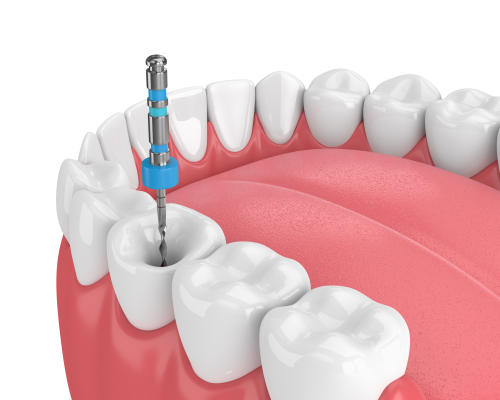
Root Canals
Every day in the United States, dentists perform more than 41,000 root canals. Root canals are an endodontic procedure that addresses the area inside the tooth called the pulp. When the pulp is infected, it must be removed to preserve the tooth's structure and prevent further damage. At Aspire Dental, we realize patients often worry about needing root canal treatment. However, advancements in dental technology and sedation dentistry mean that root canals today are not particularly painful. If you or someone you love is experiencing tooth pain, visit the compassionate team at Aspire Dental for diagnosis and treatment. What Are Root Canals? In the context of tooth anatomy, a root canal refers to the natural hollow space inside a tooth's root. Each tooth typically has one or more root canals containing the dental pulp, which consists of nerves, blood vessels, and connective tissue. These root canals extend from the tip of the tooth's root into the inner chamber of the tooth, known as the pulp chamber. When people refer to a root canal procedure, they are typically talking about a treatment that involves removing the infected or damaged dental pulp from these canals to alleviate pain and save a tooth from extraction. After we remove the infected pulp, we clean, disinfect, and seal the root canals to prevent further infection. This treatment helps to restore your oral health and stops the infection from spreading to other areas of your body. When Is Root Canal Treatment Needed? The tooth's pulp becomes infected as bacteria from the tooth's surface progress deeper into its structure. This progression usually results from deep cavities, cracked teeth, or dental injuries. While pain is one of the most common indicators that a root canal is needed, other symptoms may signal infected tooth pulp: Persistent, radiating pain that can extend to your face, jaw, or other teeth Discomfort while eating or touching the tooth Sensitivity to temperature changes Tooth discoloration Gum swelling Pus-filled abscesses near the tooth Feeling that the tooth is loose due to bone softening We also recommend root canals in cases where a tooth is cracked to prevent bacteria from entering the pulp. Maintaining regular dental checkups is essential, as not everyone experiences these symptoms. Dental visits and X-rays help us monitor your oral health and determine the most suitable treatment options if issues arise. The Procedure for Root Canals Typically, root canal therapy involves 1-2 appointments. Dr. Hall and Dr. McNeil employ cutting-edge imaging to assess the infection's severity and develop a precise treatment plan. Depending on the severity and your specific medical needs, antibiotics or anti-inflammatory medications may be prescribed in the days leading up to the procedure. The procedure begins with a local anesthetic to ensure you're pain-free. However, we also offer sedation options for patients who experience dental anxiety, including oral conscious sedation, nitrous oxide (laughing gas), and IV sedation. Our goal is to help you relax while we restore your oral health. Once you're comfortable, we will make a small opening in the tooth's crown to access and remove the infected pulp. We use specialized instruments to remove the pulp from the canals and the main chamber. Then, we meticulously clean and shape the canals before filling the space with a biocompatible material called gutta-percha. Finally, we seal the tooth with a dental filling. Root canal treatment usually lasts between 30 minutes to an hour. To strengthen the tooth, Dr. Hall or Dr. McNeil may recommend placing a custom-made dental crown. This may require a second appointment, during which the crown is securely bonded to your treated tooth.
Video: Root Canals
Link: Root Canals
-
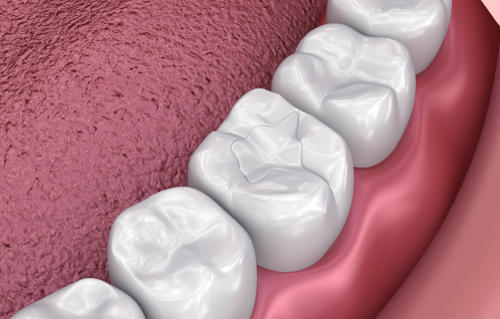
Dental Fillings
More than half of kindergartners in Texas have already experienced tooth decay. However, decay is not just a problem for kids: 96% of American adults aged 65 years or older have had a cavity. While preventable, tooth decay is the most common health condition globally. The purpose of dental fillings is to fill cavities, halting decay before it becomes a larger issue. At Aspire Dental, our approach to dental fillings prioritizes your comfort and oral health. We offer a range of options for restoring function to damaged teeth, including tooth-colored composite fillings for a natural appearance and effective cavity treatment. Signs You May Need a Dental Filling Dental cavities are caused by decay. They develop when bacteria in your mouth create tiny holes in your teeth. If not treated promptly, these holes can grow, causing pain and more damage. Dental fillings stop the decay from getting worse. You might need a filling if you notice: Toothaches, sensitivity, or pain with no obvious cause Sensitivity to sweets or hot and cold foods Visible holes or pits in your teeth Pain when you bite or chew Bad breath or taste in your mouth Stains on your teeth that appear black, white, or brown Even if you don't notice these symptoms, regular dental check-ups help us spot early signs of decay. When we catch cavities early, we can often reverse them with proper oral hygiene. If a cavity has already formed, we can use fillings to stop it from advancing. However, when left untreated, a small cavity can become a bigger and more expensive problem. The Importance of Dental Fillings Dental fillings are essential for maintaining oral health by halting the progression of tooth decay, preserving the structure of affected teeth, and preventing more extensive and costly dental procedures. Neglecting to treat a cavity can lead to a cascade of oral health problems. An untreated cavity will continue to grow, causing increasing pain and discomfort. As it progresses deeper into the tooth, it can result in infection, marked by significant pain and swelling. If the issue isn't treated with a root canal, the cavity's bacteria can spread to adjacent teeth, elevating the risk of further decay. Untreated infections can also evolve into painful dental abscesses, posing additional health risks if the infection spreads to other parts of your body. In serious cases, you may lose the damaged tooth. While our goal is to prevent tooth loss whenever possible, if you do lose a tooth from decay or other factors, we can replace it here at Aspire Dental with mini dental implants. Overall, postponing cavity treatment can lead to compromised oral health, escalating expenses, and unnecessary suffering. To avoid these complications, it's essential to address cavities promptly through regular dental visits and dental fillings.
Video: Dental Fillings
Link: Dental Fillings
Categories
Dentistry(512)491-5244 (512)-491-5244 +15124915244 (512)402-5051 (512)-402-5051 +15124025051
Map 11615 Angus Rd.
Loading map...
















